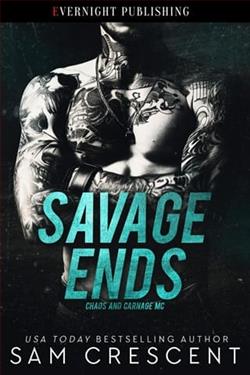Page 10 of Playing for the Hat Trick
I glance up, expecting someone new: clipboard, scrubs, a too-practiced smile.
Instead—it’s her.
Well. That explains the Laferty plastered across the name of the clinic. I figured it was a branding fluke—something that just sounded upscale enough to lure in desperate athletes with bloated contracts and busted knees. Because why the hell would a Crawford use Laferty? Everyone knows who the Crawfords are. The name carries weight. Recognition. Generational grit.
Only hardcore hockey fans like me know Mathieu Scott Laferty.
My chest locks up. Air’s right there, but I can’t get it in. She walks into the waiting room as if she owns it—which, apparently, she does—and everything else drops away.
Scottie.
Ella “Do-Not-Call-Me-Adorable” Crawford.
Let the record show she’s still fucking adorable.
Her dark hair is swept up in a way that screamsI didn’t try that hard,yet still looks editorial as hell. Clipboard in one hand, the other relaxed at her side like she might casually sign my death warrant at any moment.
And she looks right past me.
Not like she didn’t see me—more like she took one look and decided I wasn’t worth the effort. Just another mistake she scrubbed from her history. Knowing her, I probably rank somewhere between a bad haircut and a pulled hamstring.
Then her eyes lock onto mine.
One second. That’s all she gives me.
Her smile hits quickly—the fake one, not the friends-and-family one. The kind of smile that tells you absolutely nothing while making it painfully clear you’re so very fucked.
“Well, well, if it isn’t Jason Tate,” she says, her voice like smooth espresso—velvety, dark, and with a bite that lingers. “Brace, crutches, and all. Still milking that injury? Or is this your new strategy to dodge the season and rack up sympathy points?”
I raise an eyebrow. “Still using sarcasm to keep people from getting too close, huh?”
She hums, entirely unfazed. “Time for your eval. If this place can’t fix you . . .” She gestures toward the hallway like she’s about to lead me to my execution. “Well, you can always try goat yoga next. I hear it’s life-changing.”
I haul myself upright, leaning into the crutches harder than necessary—part performance, part very real pain. Every step down the hallway serves as a slow, echoing reminder that I used to move like lightning. Now, I move like a penguin.
The room she leads me into smells like sweat disguised in lavender oil and gardenia-scented lies. It’s pristine and blindingly white, every inch gleaming as if it’s been scrubbed with the tears of overachievers. A wall of mirrors spans one side. On the other side is a ballet barre, exercise bands, and a very judgmental-looking Pilates reformer. “Sit,” she says, not even glancing over her shoulder.
I drop onto the nearest bench with all the grace of a wounded wildebeest. There’s a cushion, but it’s as useless as my medical clearance—the knee brace locks into place with a mechanical click as if it’s mocking me.
She’s already flipping through a file—my file, probably already memorized, but she’s going through the motions as ifI’m just another patient, which is bullshit. She knows it. I know it.
“Phoenix,” she says, her tone flat. “Water therapy, soft-tissue work, nerve response testing. Didn’t take.”
“Nope.”
“Los Angeles. Core alignment, sensory recalibration.”
“Didn’t stick.”
“Two PTs in Colorado and one in Oregon. A sports psychologist told you to ‘lean into trust.’”
I bark out a laugh. “I told him to lean into a wall.”
That earns me the tiniest twitch at the corner of her mouth. Not a smile. Not even close. But something warmer than the glacier she walked in with. Almost like she remembers that night in Tokyo, too. The hookup that haunts me more than the games I’ve lost.
“You’ve been cleared by your team doc, three outside physicians, two surgeons, and a performance coach,” she continues, flipping the file shut.
“I’ve also failed three strength tests and can’t do a single-leg hop without my knee trying to break up with me.”















